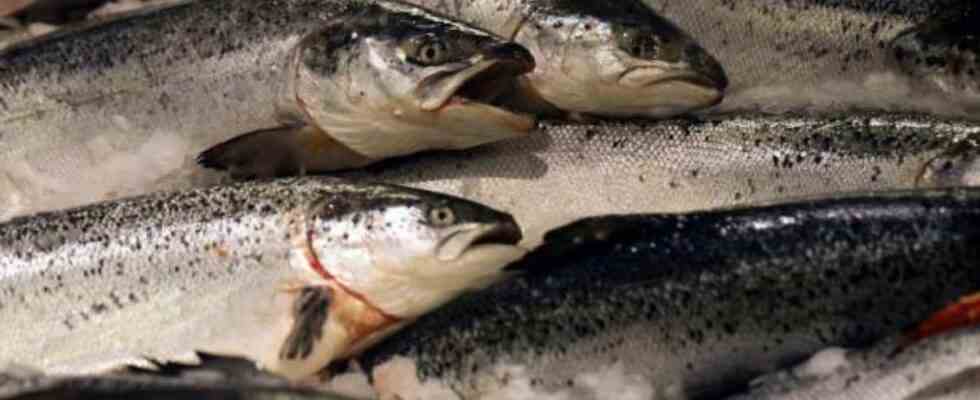“It is on this beach of La Chambrette that we come to bathe”, local activists complain, during the visit organized this Friday by Europe ecology the greens (EELV), near the future site of establishment of the group Pure Salmon, for its salmon production plant, in Verdon-sur-mer, in Gironde. “About one kilometer from this beach, there will be discharges from three to four pipes, just after the dike”, explains Esther Dufaure, involved in the collective “Eaux Secours Actissons! », a transpartisan association, bringing together non-registered citizens and political activists.
Swept by an icy wind, the beach and its dunes are located just a few kilometers from the Signal de Soulac building which will be dismantled. They are also marked by a strong erosion phenomenon and considered to be submerged in 2040, according to scientific projection maps. “And we will then be forced to dismantle this site”, points out Esther Dufaure. Pure Salmon signed on April 4, 2022, a temporary occupation agreement (for 49 years) of a 14-hectare site, owned by the Grand Port Maritime de Bordeaux (GPMB). He plans to produce 10,000 tonnes of salmon per year on this Girondin site.
A “turnkey” site, to the detriment of the environment?
The port has proposed a so-called “turnkey” site which saves nearly two years of administrative procedures for the Pure Salmon group, which should thus be able to set up there in an accelerated manner. The government wanted to facilitate the establishment of installations classified for the protection of the environment (ICPE), subject to specific regulations. “These projects ignore administrative procedures and normal environmental authorizations, deplores Marie Toussaint, MEP (EELV). Impact studies are streamlined and the European Commission can only decide downstream”.
Nicolas Thierry, Girondin EELV deputy, wrote almost three months ago to Christophe Béchu, Minister for Ecological Transition, to ask him for details on this accelerated procedure, without obtaining an answer at this time. Asked by 20 minutes last April Xavier Govare, president of the company Pure Salmon France, announced with optimism the construction of the buildings from the beginning of 2023 and the marketing of the first salmon in 2026. The deputy fears in particular that the establishment dispenses with an inventory concerning the fauna and flora, based on that carried out under the Natura 2000 zone.
A productivist model that consumes a lot of energy and water
“The Pure Salmon group is an investment fund created in Singapore and based in Abu Dhabi whose objective is to make superprofits to pay them to its investors”, loose Esther Dufaure. To make its factory very profitable, the group does not do half measures: while the concentrations of salmon recommended by the European seabed for fishing is fixed at 25 kg of salmon per m3 of water, it is considering 70 kg per m3 of water.
“Animal welfare is the main blind spot of this project in my opinion,” comments Nicolas Thierry. The project leaders I have met believe that it is ensured simply thanks to optimal water quality and moreover speak of biomass tonnages (rather than of fish) which shows that we have a very different from animal welfare. “The Covid started with a zoonosis and it is typically with concentrations like these of animal species that we risk creating a next one”, adds Anne-Laure Bedu, regional councilor for New Aquitaine, member of ecological generations.
On the operation of the factory, the filling of the 27 breeding basins is equivalent to 80 Olympic swimming pools, according to the collective “Eaux Secours Actissons”. The water is reused and filtered thanks to an advanced technology called “recirculating aquaculture system” (RAS) put forward by the group that owns it. “But 1% will be renewed (pumped and rejected), or 2,300 m3 of water per day, warns Esther Dufaure. This is the equivalent of one year of irrigation for one hectare of market gardening. In these discharges, the presence of traces of antibiotics, viruses but also ammonia, phosphorus and nitrates.
The site’s electricity consumption also promises to be staggering, “equivalent to the consumption of a city of 10,000 inhabitants (75 GW/year)”, estimates Esther Dufaure. A 45-hectare photovoltaic park is planned around the site, but it would only cover part of this consumption. The food of the fish raised in the Verdon also raises questions, whether it is soy or fish meal, these are not virtuous sectors at the ecological level.
What recourse against the project?
The “Eaux Secours Actissons” collective will file a petition against the project with the European Parliament. Benoit Biteau, MEP and First Vice-President of the Agriculture and Rural Development Committee, wants the European Commission to call the French State to order, arguing that the project is “probably in serious breach of several framework directives (water , groundwater, strategies in the marine environment). and against the current of the history of the 21st century”.
If the group prides itself on relocating 99% imported production, in particular from Norway and Chile, environmentalists point to a model that is harmful to the environment. “They are right on one point, there is an issue of sovereignty, recognizes Nicolas Thierry. But that does not mean that we have to reproduce here, in France, the worst breeding practices, but that models other than the intensive and industrial one are possible”. It also recalls that it will be necessary collectively to reduce its consumption of meat and fish to meet the objectives of the fight against climate change.
If it comes out of the ground, this plant will be the first of this size in Europe.

